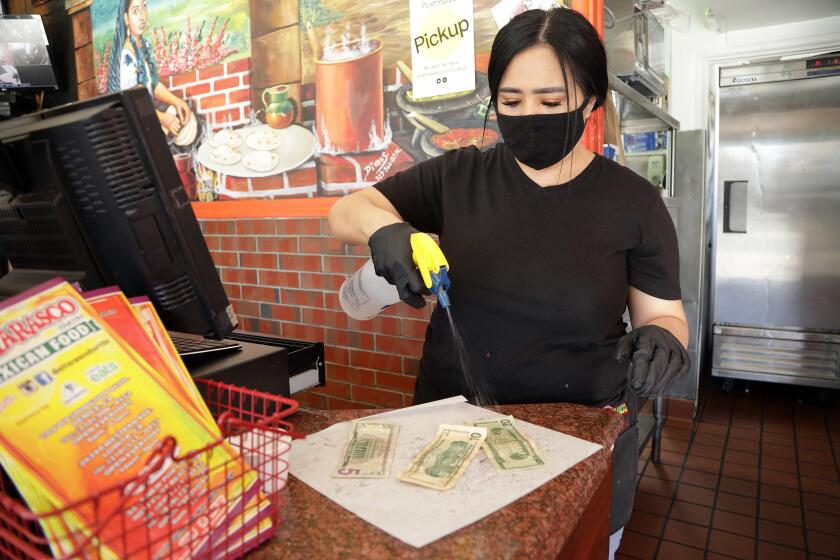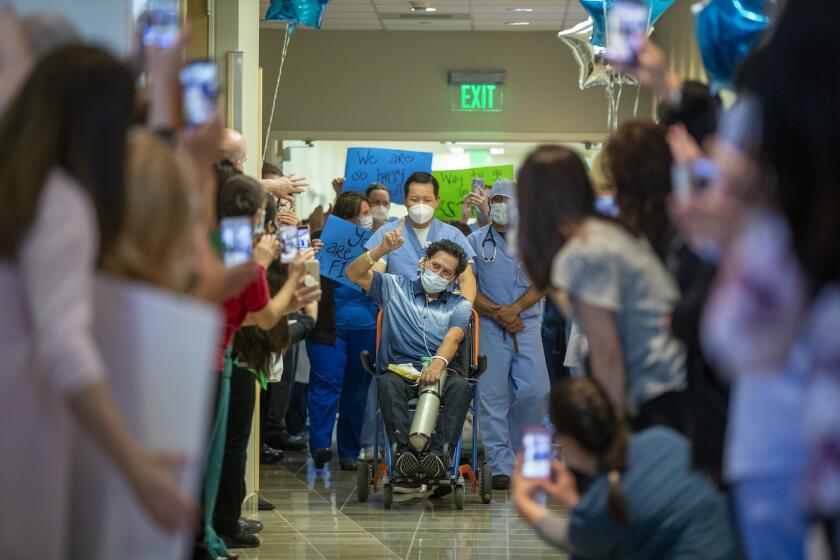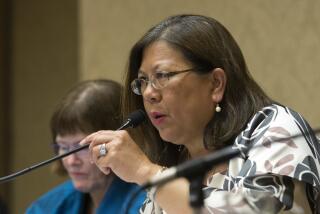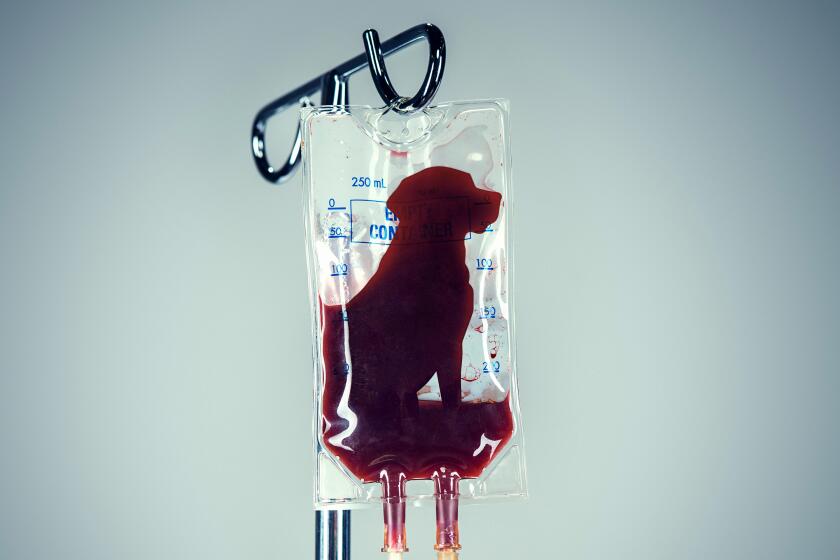Desperate for coronavirus help, California spending billions on no-bid contracts with little accountability
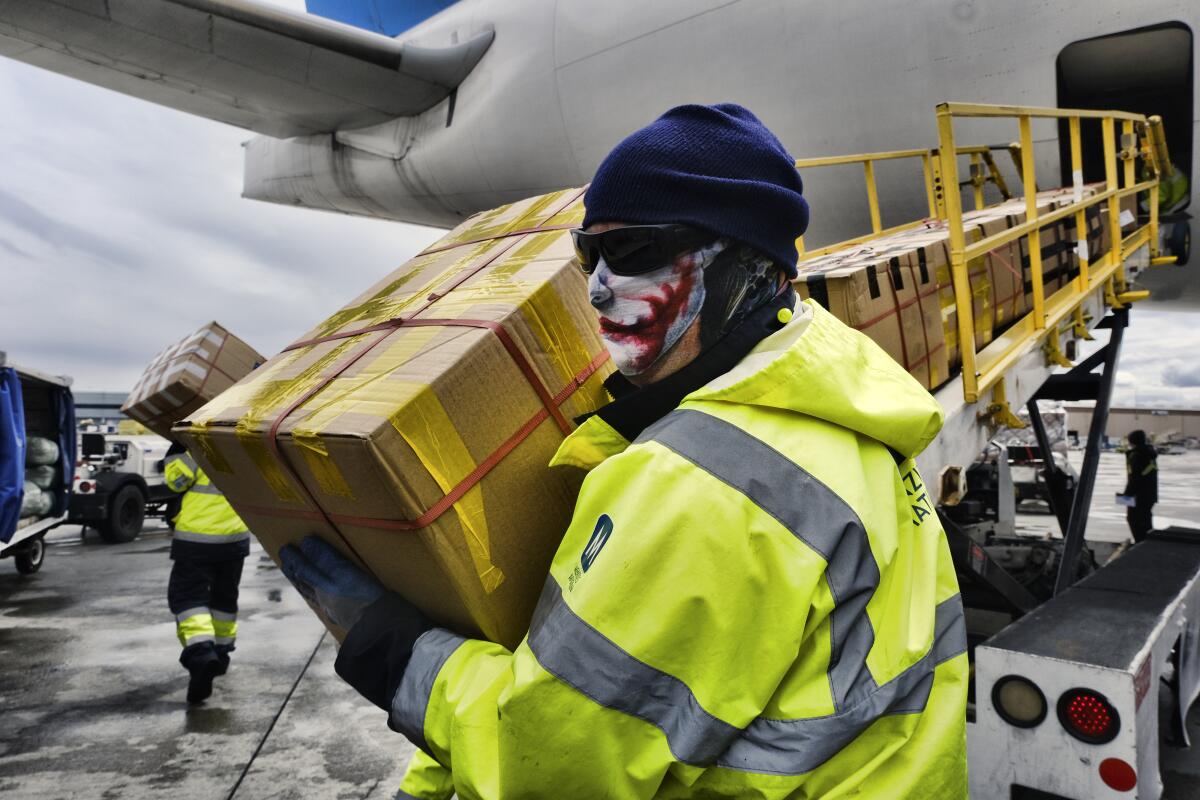
- Share via
In a frantic effort to secure face masks and respond to the coronavirus crisis, California has committed to spend more than $3.7 billion on no-bid contracts, scores of them with businesses that have no track record with the state.
A Times data analysis found that nearly a third of those funds — about $1.2 billion — has been earmarked for suppliers of goods and services that do not appear in the state’s database of contracts prior to the COVID-19 outbreak.
Since Gov. Gavin Newsom’s emergency order on March 4, at least 80 were to first-time vendors, including a medical staffing firm that signed a $500-million deal and a company headed by the former attorney general of Alabama, who secured orders for more than $326 million for face masks and shields.
There have already been examples of questionable deals and alleged fraud across the country. The Times reported last month that California officials are paying more than 300% above list prices for masks. And a powerful California union that claimed to have discovered 39 million masks for healthcare workers fighting the novel coronavirus was duped in an elaborate scam uncovered by FBI investigators, authorities alleged.
Spending watchdogs acknowledge that state governments are under immense pressure to secure medical supplies during times of crisis.
But they caution that if officials don’t adhere to accepted purchasing protocols, such as dealing only with companies that have direct lines to manufacturers and proven track records in government contracts, they could result in bad deals.
Los Angeles Times’ visual coverage of the coronavirus crisis
“Pandemic times lead to pandemic decisions, which are not usually well-thought-out,” said Sergio Fernandez de Cordova, the chair of a media nonprofit in New York who is working with the consulting firm Raymond Associates LLC to secure better mask deals for government agencies.
The state’s initial pandemic response is estimated to cost at least $7 billion by the end of the year, and the Newsom administration has told lawmakers the state is counting on the federal government to pick up the bulk of those costs. But FEMA must first determine whether purchase prices were reasonable, according to a guidance drafted by the Office of Emergency Services.
Under California’s emergency order, state agencies can make purchases and sign contracts without the usual accountability measures required for multi-million dollar deals, such as obtaining competitive bids or waiting for delivery before payment.
Jon Coupal, president of the Howard Jarvis Taxpayers Assn., said the public is generally forgiving of “decisions made on the fly in an emergency,” but that transparency is paramount.
“When your house is on fire, taxpayers understand that you won’t price-check hoses — you have to act quickly,” he said. “But the state needs to come clean on what they bought and how it was negotiated.”
It’s unclear how much has been paid out so far.
These are some of the unusual new scenes across the Southland during the coronavirus outbreak.
Until Wednesday, one of California’s largest and least transparent transactions had been a nearly billion-dollar contract for protective masks from Chinese automaker BYD.
Government contracts are public under state law. But Newsom’s Office of Emergency Services had refused to make the BYD contract public or to disclose such relevant details as the price per mask, claiming that doing so “would introduce substantial and unnecessary risk to the state’s ability to secure necessary supplies.”
Documents subsequently obtained by The Times from the state treasurer’s office through a public records request show that California agreed to pay $3.30 per mask made by a BYD subsidiary, Global Healthcare Product Solutions.
On Wednesday, Newsom abruptly shifted course to release the BYD contract, which revealed the company agreed that same day to reimburse the state $247.5 million for a delay in the mask delivery. Newsom blamed government attorneys for the delay in releasing the contract.
“A lot of these contracts haven’t been made public as quickly as we would like them to be,” he said during a midday briefing streamed online. “And you, the public, deserve that information.”
Details on many other state deals worth hundreds of millions of dollars have been similarly hard to come by.
In contrast, when Los Angeles Mayor Eric Garcetti announced that the city would buy 24 million N95 masks over the course of two years at 79 cents each, the contract was released to The Times days later.
The potential peril of cutting deals with new suppliers was illustrated in late March when state officials abruptly clawed back a wire transfer of nearly $500 million to a firm that was offering protective masks, according to state treasurer’s records.
The company, Blue Flame Medical LLC, was founded recently by two GOP operatives to provide coronavirus-related supplies. A company official did not return a call for comment. The deal’s collapse was first reported this week by CalMatters. The company had another contract with Maryland that was also canceled.
State officials say some companies with no record of previous business with California have so far delivered on their agreements.
The state agreed last month to pay $2.8 million to a Pennsylvania outfit called Arnold’s Used Office Furniture to supply face masks to the corrections department.
The company, which has a furniture showroom in suburban Philadelphia, had not previously done business with the state, and its website touts conference room tables and cubicle dividers but not personal protective gear.
Messages left for company President Jordan Berkowitz, 33, a onetime teen poker prodigy who took over his family furniture business, were not returned.
Despite appearing to be new to the mask dealing industry, Arnold’s Used Furniture has delivered 1 million surgical masks ordered for 79 cents each and 650,000 KN95 masks are expected to be delivered next week at $2.80 each, a corrections department spokeswoman said.
In addition to medical supplies, the state also has struck deals for services.
The California Department of Public Health signed a six-month contract on March 23 for up to $1 billion with the healthcare staffing firm Aya Healthcare to provide workers at hospitals the state opened to help with the pandemic.
Aya Healthcare declined to comment on any of the particulars of the contract, citing a request from state public health officials.
“I can’t comment on that contract,” said Sophia Morris, vice president of account management at Aya Healthcare, which is headquartered in San Diego. “They’ve told me to redirect you back to them.”
The state’s public health department offered few details about the contract and is reviewing The Times’ request for its release, a spokeswoman said.
On April 3, the state public health department also inked a $500-million deal with Medefis, a Nebraska-based company that maintains a national database of healthcare professionals for hire.
State procurement records show that Medefis, which has not previously worked with the state, billed for $706,000 so far under the contract.
One of the state’s largest contracts, for more than $300 million, went to Bear Mountain Development Co. LLC. The company was formed in 2014 by Troy King, who served as Alabama’s attorney general from 2004 to 2011. He mounted a losing campaign for the same post in 2018, and in March of this year he was knocked out of the race for a seat in the U.S. House when he finished fourth in Alabama’s Republican primary.
On April 8, Mark Ghilarducci, the director of the Governor’s Office of Emergency Services, cited Bear Mountain as an example of California “working with direct contracts” with large vendors to obtain tens of millions of masks.
Since then, the state has made deals with Bear Mountain totaling more than $326 million for face shields and medical isolation masks, according to state procurement records.
It’s unclear how and when King, 51, got into the medical supply business. He currently heads a small personal-injury law firm in Montgomery, Ala.
Alabama corporate records show he has been involved with a dozen businesses as an officer, organizer or registered agent. Several, including Rx Connections and Rx Solutions, appeared to be in the healthcare field, but they and most of the other business entities have been dissolved.
Among those still in existence is Innovate! Technologies Inc., which King formed in 2012. According to an article on the AL.com website in 2013, the company had developed a game called “O-craps!” offered to Indian casinos.
“It looks like a craps game,” King told the website, “but it’s bingo balls, bingo cards, daubing, etc. … It’s bingo.”
King and Bear Mountain were included in a recent ProPublica article about another entrepreneur’s failed effort to execute a $34-million contract to deliver masks and other protective equipment to the Veterans Administration. King had offered to broker that deal but a spokeswoman told ProPublica that no agreement was made.
King didn’t return phone calls and emails for comment for this story.
Bear Mountain’s supplier appears to be Mimish-PPE, a New York company formed late last month, according to its website and state business filings. Mimish says on its website that it’s fulfilling a California order with Bear Mountain for 400 million masks and 200 million face shields.
Mimish PPE shares the same Brooklyn address as Mimish Designs, which sells craft bean bags, throw pillows and other stylish goods.
Mimish representatives did not return phone calls and emails.
Times staff writers John Myers, Harriet Ryan, Dakota Smith and Paige St. John contributed to this report
More to Read
Sign up for Essential California
The most important California stories and recommendations in your inbox every morning.
You may occasionally receive promotional content from the Los Angeles Times.
